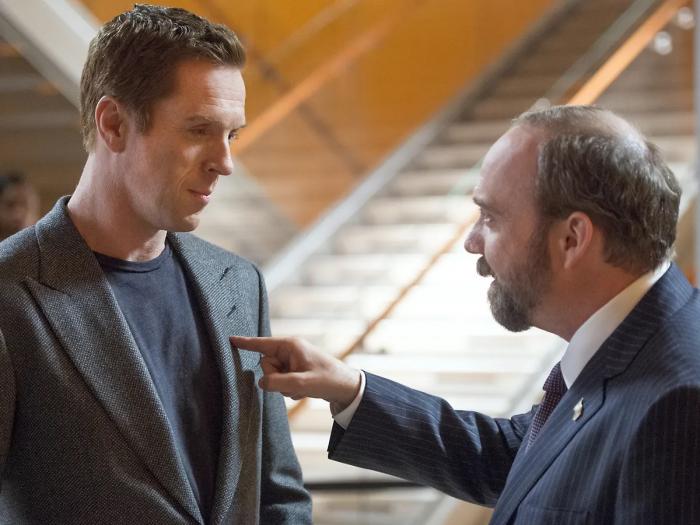By Dustin Rowles | TV | October 31, 2023

After seven seasons of Showtime’s Billions, the series concluded over the weekend. I started the first season of the series when it premiered back in 2016, but I couldn’t get into it. However, I gave it another shot between the third and fourth seasons, tore through it, and became, if not a superfan, at least a massive admirer of the series.
For the unfamiliar, Billions is a pre-Succession series about greed, ambition, and power, but mostly it is about revenge. Damian Lewis plays a hedgefund billionaire named Bobby Axelrod, and Paul Giamatti plays his nemesis, a district attorney named Chuck Rhoades. Rhoades is a politician from a privileged upbringing who endeavors to amass power by taking down Axelrod. In contrast, Bobby generates his wealth on the backs of others but spends much of his time thwarting attempts by Rhoades to financially ruin and imprison him. There is a significant conflict of interest because Rhoades’ wife, Wendy (Maggie Siff), is Axelrod’s in-house therapist and Bobby whisperer.
There are also several colorful supporting characters — Axe’s right hand, Wags (David Costabile); Rhoades’s right-hand woman, Kate (Dola Rashad); as well as several employees at both Axe Capital and in the D.As office — but the conflict between Axe and Rhoades is what fueled the earlier seasons of the series. The show, however, has also been very good at reinventing itself, which usually involves rearranging alliances. There are times when Chuck and Axe work against each other; there are other times when they work with each other against a common enemy; and there are yet other times when new characters are introduced that act as antagonists to both of them (the introduction of Asia Kate Dillon’s Taylor Mason generated a lot of upheaval).
In later seasons, the series introduces another central character, Mike Prince, played by Cory Stoll, who acts as a foe to Bobby Axelrod before replacing Bobby for a season after Lewis lost his wife, only to become Axe and Chuck’s common enemy again in the final season. Creators Brian Koppelman and David Levien, working with financial columnist Andrew Ross Sorkin, have kept things interesting even in the show’s latter seasons. Somehow, Billions managed to steer clear of the shark.
Much of why it works is that they are all bad people. You never know who to root for, but you also don’t know who to root against, at least until the final season when the real villain becomes clear. Axe and Chuck are cutthroat, morally compromised people, but they never claim to be otherwise. Mike Prince is a billionaire who thinks he is a good man, making him so loathsome. Naturally, he runs for President of the United States. Preventing him from becoming President is what motivates Chuck and Axe to work together with all their various friends and nemesis to bring him down.
All that has been fun to watch, with all of the financial schemes, capers, and heists that the characters plot against one another in each episode and throughout each season, but what I have appreciated most over seven seasons of Billions is not the storylines or even the characters. It’s been the language. These people love the sound of their own voices, and I don’t blame them. Here’s Chuck Rhoads reading Churchill to, oh sh**! I just randomly plucked this video, but that’s my real-life step-uncle-in-law:
The language of Billions is so foreign to me that, for several seasons, I thought it was a made-up language, not unlike that of David Milch’s Deadwood. It’s a sort of douchebag finance bro language by way of Shakespeare, and having Lewis — and especially Paul Giamatti — deliver the lines gave it a sense of gravitas. c—-s———, for instance, is a low-class homophobic insult, but when Ian McShane delivers the word in Deadwood, there’s mustard on it. The word has heft; it carries weight.
Likewise, the language of Billions — and the style in which all of these characters delivered their lines, projecting as though to the back of the theater while pronouncing every period — provided the series with an extra dynamic, a thin veneer of profundity overlaying the base motives of the series’ characters.
What’s interesting — at least to me, someone who is otherwise ignorant of this world — is that Succession operates with a similar language. More recently, while reading Michael Lewis’ book on Sam Bankman-Fried, I heard it again. It’s when I realized that the language of Billions is not made up. It’s not even an exaggerated version of reality. This is how people in the finance world actually speak: It’s the language of corporate meetings; it’s meaningless buzzwords disguised as wisdom. It’s nonsense delivered with absolute authority.
This is the world in which we live. It’s why we mistakenly believed that people like Elon Musk, Travis Kalanick, and Jack Dorsey were more intelligent than they were. It’s not intelligence. It’s confidence combined with no self-awareness, obliviousness, and an absolute certainty that they are right. It’s the Dunning-Kruger effect embodied in a language spoken by the world’s worst people. And for seven seasons, Billions brilliantly captured this profound drivel.
Where Suits trades in manilla folders, Billions trades in pointed monologues, and I like Suits, but this show is in a completely different league in terms of both writing and performance. The Billions universe will continue in a series of spin-offs that will include series like Millions and Trillions, and I will continue to watch, not because these characters are good. But because they are so deliciously, richly awful.